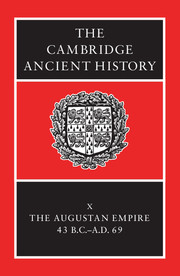7 - The imperial court
from PART II - THE GOVERNMENT AND ADMINISTRATION OF THE EMPIRE
Published online by Cambridge University Press: 28 March 2008
Summary
INTRODUCTION
If the powers of Augustus and his successors were monarchical, the most important arena where those powers were exercised was the court. Both as an institution and as a word, the court was alien to the Republic. Aula, a direct derivative of the Greek aule, the standard term in the hellenistic world for the courts of oriental and Greek kings, is almost unknown to republican literature (including Livy); but rapidly establishes itself under the early Empire (notably in the writings of Seneca under Nero) to refer both to the physical location of imperial power and to the type of power, the personnel, and the perilous way of life that were associated with it. New though the phenomenon was to the Romans, they were well aware that what they now experienced was an old feature of monarchical societies. ‘Reflect,’ observed the emperor Marcus Aurelius in his Meditations, ‘how all the life today is a repetition of the past… the whole court circle of Hadrian for example, or the court of Antoninus, or the courts of Philip, Alexander and Croesus. The performance is always the same; it is only the actors who change.'
The historical and biographical sources recognize the role of the Julio-Claudian court. Stories told about Vespasian's early career encapsulate assumptions about how court life worked. His success under Claudius was ascribed to the influence of the freedman Narcissus; he also had a mistress, Caenis, among the imperial freedwomen. His son, Titus, was brought up at court (in aula) with Britannicus.
Keywords
- Type
- Chapter
- Information
- The Cambridge Ancient History , pp. 283 - 308Publisher: Cambridge University PressPrint publication year: 1996
References
- 23
- Cited by

